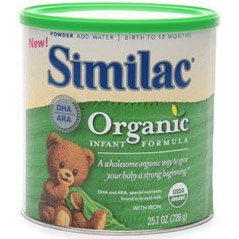Aptamil is investigating a complaint that some of its baby milk might be linked to an 11-week-old boy getting food poisoning.
 Laura Stevens found 50p-sized blood spots in her son Roman’s nappy and took him to the doctors.
Laura Stevens found 50p-sized blood spots in her son Roman’s nappy and took him to the doctors.
He was sent to hospital where he remained for a week with constant diarrhea and a temperature. Doctors said he had a campylobacter infection but could not give a source.
Miss Stevens, a first-time mum, said the only food she had given her son was Aptamil milk powder – but the company’s initial quality checks have come back clear.
The 30-year-old, from Swindon, Wiltshire, said: ‘Roman’s tests came back and showed he had food poisoning.
‘I was gobsmacked, his insides had swollen from the food poisoning and the blood was the bacteria trying to get out of his little body.’
The insurance worker said Roman was left lethargic and pale while he was in hospital. The strain of bacteria is commonly found in meat and poultry.
While Aptamil is investigating she has stopped giving Roman the product and switched to a different milk product.
Aptamil confirmed it is investigating and said it had not had any other complaints.
A spokesman said: ‘We are aware of this complaint and are concerned to hear that Roman had been unwell.
‘We have been in contact with her and are pleased that he is recovering.
‘All our milks are manufactured to stringent quality standards including high temperature processing and a number of quality tests before they are released for sale.
‘We have checked our production records and know that all of the quality checks were carried out. We have not received any other similar complaints.”
Public Health England said it had not been asked to investigate but were aware of a confirmed case of campylobacter in a young child in the Swindon area.

 appears to be flour. These cans were found at the following retail locations: Your Independent Grocer on Strandherd Drive and Sobeys on Greenbank Drive in Nepean, Ontario.
appears to be flour. These cans were found at the following retail locations: Your Independent Grocer on Strandherd Drive and Sobeys on Greenbank Drive in Nepean, Ontario. An investigation by the State Council, China’s Cabinet, has found that for eight months, China’s biggest producer of powdered milk, Sanlu Group Co. “did not inform the government and did not take proper measures, therefore making the situation worse.”
An investigation by the State Council, China’s Cabinet, has found that for eight months, China’s biggest producer of powdered milk, Sanlu Group Co. “did not inform the government and did not take proper measures, therefore making the situation worse.” "We want to reassure the public that there’s no contamination in the domestic supply of infant formula," says Janice Oliver, deputy of operations for FDA’s Center for Food Safety and Applied Nutrition.
"We want to reassure the public that there’s no contamination in the domestic supply of infant formula," says Janice Oliver, deputy of operations for FDA’s Center for Food Safety and Applied Nutrition. Dr. Benjamin Caballero, director of the Center for Human Nutrition at the Johns Hopkins Bloomberg School of Public Health and an expert in risk factors for childhood obesity, said,
Dr. Benjamin Caballero, director of the Center for Human Nutrition at the Johns Hopkins Bloomberg School of Public Health and an expert in risk factors for childhood obesity, said,